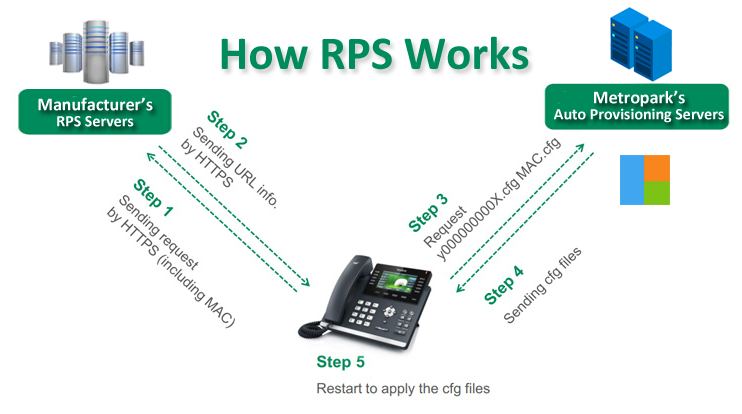MPVEX: Redirect and Provisioning Service – RPS
Streamlining Business Communication: The Importance of MPVEX and RPS
In today’s fast-paced business environment, effective communication is key to success. Whether you’re a small startup or a large corporation, having a reliable and efficient phone system is essential for staying connected with customers, clients, and colleagues. This is where cloud VoIP PBX systems like Metropark Voice Exchange (MPVEX) and manufacturers like Yealink, Snom, and Grandstream’s Redirection and Provisioning Service (RPS) come into play. In this blog, we’ll explore the importance of MPVEX and RPS in streamlining business communication.
What is MPVEX?
MPVEX is a cloud-based VoIP PBX system (PBX in the CLOUD) designed to meet the communication needs of businesses of all sizes. Unlike traditional phone systems that rely on physical hardware and complicated wiring, MPVEX operates entirely in the cloud, offering flexibility, scalability, and cost-effectiveness.
With MPVEX, businesses can enjoy a wide range of features, including:
Auto-Provisioning
MPVEX allows for seamless integration with a variety of IP phones from manufacturers like Yealink, Snom, and Grandstream. This means that setting up new phones or adding extensions to your existing system is quick and hassle-free.
Unified Communications
MPVEX offers a suite of unified communication tools, including voice calls, video conferencing, instant messaging, and more. This enables teams to collaborate more effectively, regardless of their location.
Advanced Call Routing
MPVEX allows for sophisticated call routing options, ensuring that calls are directed to the right person or department every time. This helps improve customer service and streamline internal communication workflows.
Scalability
Whether your business is just starting out or rapidly growing, MPVEX can easily scale to meet your needs. You can add or remove users, upgrade features, and expand your system with ease.
The Role of RPS
RPS, or Redirection and Provisioning Service, is a crucial component of the MPVEX ecosystem. RPS enables seamless auto-provisioning of IP phones from manufacturers like Yealink, Snom, and Grandstream, ensuring compatibility and ease of deployment.
Here’s how RPS works:
Automatic Configuration
When you connect a supported IP phone to your MPVEX system, it automatically reaches out to the RPS server to retrieve its configuration settings. This eliminates the need for manual configuration, saving time and reducing the risk of errors.
Firmware Updates
RPS also facilitates automatic firmware updates for IP phones, ensuring that they are always running the latest software version. This helps improve security, stability, and performance.
Centralized Management
With RPS, Metropark can centrally manage and monitor all connected IP phones from a single interface. This makes it easy to track usage, troubleshoot issues, and make configuration changes as needed.

The Importance of MPVEX and RPS
So, why are MPVEX and RPS important for businesses?
Enhanced Efficiency
By automating the provisioning and management of IP phones, MPVEX and RPS help businesses save time and resources. Employees can focus on their core tasks without worrying about the complexities of phone system setup and maintenance.
Improved Reliability
Cloud-based VoIP systems like MPVEX offer greater reliability and uptime compared to traditional phone systems. RPS ensures that IP phones are always properly configured and up to date, minimizing the risk of downtime or service disruptions.
Cost Savings
With MPVEX and RPS, businesses can enjoy lower upfront costs and predictable monthly expenses. There’s no need to invest in expensive hardware or hire IT staff to manage the system, making it a cost-effective solution for businesses of all sizes.
Scalability and Flexibility
MPVEX and RPS can easily scale to accommodate the changing needs of your business. Whether you’re adding new employees, opening new locations, or expanding your services, you can quickly adapt your phone system to meet your evolving requirements.
In conclusion, MPVEX and RPS offer a powerful combination of features, reliability, and scalability that can help businesses improve communication, streamline operations, and drive growth. By leveraging the latest cloud-based technology and automation tools, businesses can stay ahead of the competition and deliver exceptional customer experiences.